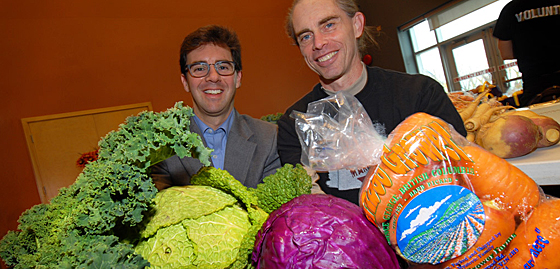UNBC leading major new agricultural land use study
“Are governments doing what Canadians want with respect to farmland?”
This is the question under investigation in a new study led by the University of Northern British Columbia. The three year project, headed by UNBC Environmental Planning Associate Professor David Connell, will examine how the changing role and value of farming in Canada may affect agricultural land use within and across national, provincial, and municipal jurisdictions.

Media Download: UNBC professors Mattias Margulis and David Connell are examining how the changing role and value of farming in Canada may affect agricultural land use within and across national, provincial, and municipal jurisdictions.
“The average person shopping at a grocery store does not know where his food comes from. And the average Vancouverite visiting a farmers’ market because she values ‘eating local’ might be surprised at how much prime farmland has been overtaken in the Fraser Valley for commercial, residential, and industrial interests,” says Dr. Connell, who is investigating the issue with researchers from across Canada, including fellow UNBC International Studies Assistant Professor Matias Margulis.
Dr. Connell says the biggest cities in Canada are situated where they are in part because that is where the best farmland is located. Consequently, as cities expand, land identified as being some of the most fertile in Canada is being replaced by developments such as golf courses, condominiums, and shopping malls.
“In BC, the area of greatest impact is in the Fraser Valley because that’s where there is the greatest level of urbanization and also the greatest quantity and quality of farmland,” says Dr. Connell. “How important is the preservation of our best farmland to the public in BC and to the citizens of communities across Canada? Are local, provincial, and federal bodies implementing policies that reflect the priorities of citizens? We are going to try to measure that.”
"Prior to 1972, local governments approved the conversion of about 5000 hectares of prime agricultural land to urban use each year," says Dr. Connell. "The quality of farmland in the Agricultural Land Reserve (ALR) has decreased, with more prime farmland (Class 1, 2, and 3) being excluded than being included. Likewise, most of the additions to the ALR have taken place in Northern BC, which growing conditions and soil quality are not as good. This means that the best farmland in the Lower Mainland is being replaced with less productive land in the North. So while it looks like the total amount of farmland has not changed the quality of the land has deteriorated."
Dr. Connell says the growing local food movement will be one of the factors evaluated in the study. That movement argues that there are social, economic, and environmental consequences for bringing food to communities from far away. Proponents also claim the food is healthier, fresher, and more nutritious. “If this movement continues to grow then there is a corresponding need to strengthen legislation that protects local farmland,” says Dr. Connell.
The research will also examine other issues affecting Canadian agriculture land use planning such as globalization, policies affecting farmland preservation, and issues of food sovereignty, or the right of people to define their own food systems.
The research findings will be presented to all three levels of government, distributed to agricultural advisory committees, and will culminate in a national forum to discuss the final results, and weigh possible best practices for communities and governing bodies.
Funding for the study comes from a Social Sciences and Humanities Research Council Insight Grant worth $464,000. The proposal was selected from 1,799 submissions from across Canada.